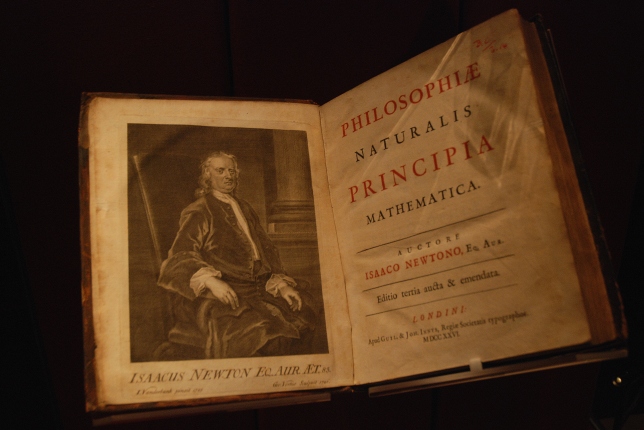
According to many popular books on history of science, the modern world came to be in 1687. That year Isaac Newton published his Philosophiae Naturalis Principia Mathematica, more commonly known as the Principia, which was an instant hit and changed the way we think about the system of the world for good. No more weird Cartesian vortices, but gravitational forces keeping everything together, described by a theory based upon firm mathematical proofs.
Not so easy
As the more perceptive of you know, it wasn’t as easy as that. Newton’s Principia was (and is) ridiculously difficult to understand, with only a handful of the most able philosophers and mathematicians of his day being able to follow its dense mathematical structure and agree upon Newton’s conclusions. And even that connection wasn’t as obvious as it might seem in the first place. Modern physics is firmly rooted into advanced mathematics, with most physical discoveries being the result of mathematical calculations. But in Newton’s days, mathematics hadn’t reached that status yet. One could be in agreement about the soundness of a particular mathematical proof, yet firmly disagree about its implications for the world we live in.
Voltaire
It took nearly a century for Newton’s ideas to become mainstream physics. When Voltaire visited England between 1726 and 1729, he gave a very nice description on the difference between English and French natural philosophy:
A Frenchman who arrives in London, will find philosophy, like everything else, very much changed there. He had left the world a plenum, and he now finds it a vacuum. At Paris the universe is seen composed of vortices of subtile matter; but nothing like it is seen in London. In France, it is the pressure of the moon that causes the tides; but in England it is the sea that gravitates towards the moon; so that when you think that the moon should make it flood with us, those gentlemen fancy it should be ebb, which very unluckily cannot be proved. For to be able to do this, it is necessary the moon and the tides should have been inquired into at the very instant of the creation.
You will observe further, that the sun, which in France is said to have nothing to do in the affair, comes in here for very near a quarter of its assistance. According to your Cartesians, everything is performed by an impulsion, of which we have very little notion; and according to Sir Isaac Newton, it is by an attraction, the cause of which is as much unknown to us. At Paris you imagine that the earth is shaped like a melon, or of an oblique figure; at London it has an oblate one. A Cartesian declares that light exists in the air; but a Newtonian asserts that it comes from the sun in six minutes and a half. The several operations of your chemistry are performed by acids, alkalies and subtile matter; but attraction prevails even in chemistry among the English.
Apparently, almost four decades after Newton’s Principia, the French were still far from convinced about the validity of Newton’s system, and clung to their beloved Rene Descartes and his corpuscular theories.
What is gravity?
In a sense, this should not come as a surprise. Newton’s theory of forces, of action at a distance, is rather counter-intuitive. In a time when all philosophers sought to eradicate the occult from their world-views, suddenly Newton introduces a quality whose origin is unknown, which has no colour or shape, a quality which itself cannot be measured, only its effects. We ourselves have grown accustomed to it. When something falls to the ground, we say: that’s because of gravity. But when someone asks: what is gravity? – we honestly have no answer.
Newton’s calculations proved that gravity definitely exists, and that we are justified to discuss it as a concept. It does explain why planets revolve around the sun, why the moon orbits the earth, why we have tides, and how comets move through the universe. Newton could not tell what gravity is, and oh boy, did he search for an answer to that question. Because it ultimately did not satisfy him either, to propose a theory without being able to understand, let alone explain, the constituency of its main ingredient.
Mystery
With Newton, “All was light”, as Pope wrote after Newton’s death in 1727. And the Principia is likewise seen as the epitome of the Enlightenment. One wonders how much light Newton’s work really shed upon nature. Because, ultimately, the High Priest of Nature decided that the mysticism of numbers should prevail.